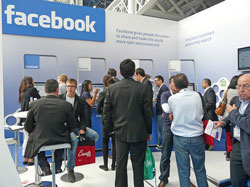Facebook celebrated its 10th birthday last week. While it might seem as if this social network has always been a part of our lives, people forget that when Facebook started, it was not the social network MySpace was. However, 10 years later MySpace is regarded as a bit of a curiosity, while Facebook boasts around 1.3bn users worldwide.

Facebooke live on 21 September, 2010, ad:tech, London. (Image:
Derzsi Elekes Andor, via Wikimedia Commons)
Amanda Sevasti, Head of Social Media, NATIVE VML, says it is Facebook's business savvy that has made it the success it is. "The cleverest thing they did was the advertising model they adopted. You do not have to go through a media company to advertise on Facebook and you can advertise for as little as R1,000. Compare this, for example to Twitter, where the minimum spend is US$10,000. Facebook is much more accessible and therefore successful, as Twitter too is finding out."
The platform has also been quick to adapt to market dynamics. "They have got a combination of things at the right place and at the right time. Facebook was also designed for everyone while MySpace was for creatives, such as writers and musicians. Facebook tapped into the move from anonymity to the norm of being yourself online."
Keeping it simple pays off
She adds that from a user experience Facebook is simple, clean and had good UX built into it from the beginning. "MySpace, in contrast, was shocking from a user experience point of view. It was a difficult site to navigate and very unattractive as well."
Looking forward, Facebook will need to find new markets as their developed markets are quite saturated. "China is not an option for Facebook as we all know, so they will have to focus on emerging markets such as Africa." She says this is why the move to mobile is so important for the social network and while mobile is a big focus for them now, it is one that should have been focused on years ago.
Facebook is not for brands. That is one train of thought, but any platform that is popular needs advertising to survive. The trick, explains Sevasti, is for brands to get the balance right. "If a brand wants to play on this platform - and brands should- they must ensure they deliver high-quality content. Facebook itself will not allow content that is not of a certain quality and rewards brands that deliver good content by making them prominent to users."
So it's a 'Like'? So what?
What brands are also beginning to realise is that 'Likes' actually mean very little. "Likes are a vanity matrix. Most CEOs do not understand what a 'Like' is and that it is just a number. It is the same as placing an advertisement during a television show with two million viewers. This does not mean that two million people saw your advertisement," explains Sevasti. "It is better to have a page with 3,000 fans and 10% engagement rate than one million fans and no engagement rate. With Facebook what is desirable is engagement, which is content that is being shared by the right people at the right time."
While we are behind the US, Europe and the other BRIC countries, in South Africa the change is happening and more brands are investing in Facebook, she says. "We are still behind the rest of the world, but social media is becoming more important as CEOs and senior managers begin to buy into it. I would like to see more quality content from brands in South Africa that engages a community in a long term conversation on Facebook."



































